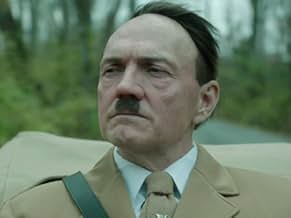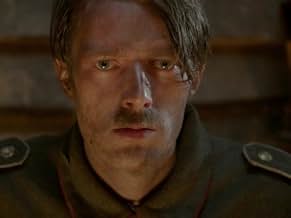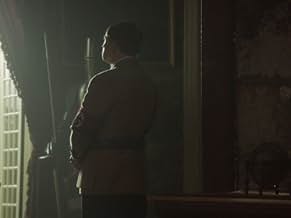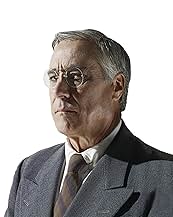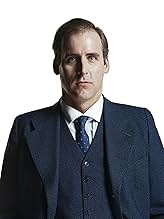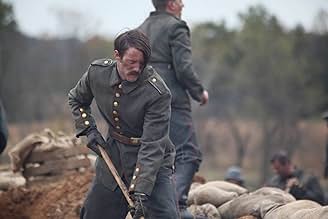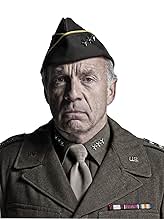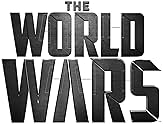CALIFICACIÓN DE IMDb
7.9/10
2.5 k
TU CALIFICACIÓN
Un repaso a las dos Guerras Mundiales y a lo que hicieron los grandes nombres de la historia durante cada una de ellas y en el tiempo intermedio.Un repaso a las dos Guerras Mundiales y a lo que hicieron los grandes nombres de la historia durante cada una de ellas y en el tiempo intermedio.Un repaso a las dos Guerras Mundiales y a lo que hicieron los grandes nombres de la historia durante cada una de ellas y en el tiempo intermedio.
- Nominado a 3 premios Primetime Emmy
- 1 premio ganado y 4 nominaciones en total
Explorar episodios
Opiniones destacadas
The Germans made continental war because they had not fleet. They had not fleet because the treaty of Vesailles did't allow it. Tanks and Airplaine could be built in secrecy in Hangars, which is much more difficult with ships. The negotiations after world war One were still held form a colonial perspective, which led to all the following problems. Borders and Lands were traded by the winning Nations like pieces of cake on a market. Italy and Japan, in World War One on the side of the Alliance were cheated, which led to the following conflicts. The War between Japan and the USA was the first war about Oil. All in all, cheesy acting, but good history telling.
The History Channel presents a miniseries of six hours on three nights as an overview of the concept that the beginnings of WW I and the events that occurred in that first World War were played out by the same set of characters and in doing so the series presents the backgrounds of each of the major world players in a manner that allows us to see them as individuals rather than historical tropes. Until Amazon makes this available this review is pictured by another series made two years ago with a bit of a different approach. But for those who may be deciding whether or not to catch the current series, hopefully this brief overview will assist.
As the description for the series state, 'The World Wars tells the story of three decades of war told through the eyes of various men who were its key players: Roosevelt, Hitler, Patton, Mussolini, Churchill, Tojo, DeGaulle and MacArthur. The series examines the two wars as one contiguous time line starting in 1914 and concluding in 1945 with these unique individuals coming of age in World War I before ultimately calling the shots in World War II.
Narrated by Jeremy Renner and with comments throughout the series from Colin Powell, Dick Cheney, Leon Panetta, John McCain, John Major, Mario Monti and many historians and correspondents form the US and Britain, the series is a collage of battle scenes (some repetitive, but war is repetitive), but adding the young and old versions of Stalin (Jacopo Rampini /not listed), Mussolini (Nabil Vinas/Jonathan Hartman), MacArthur (Prescott Hathaway/not listed), DeGaulle (Michael Perrie. Jr./Don Meehan), Churchill (Tom Vickers/Ian Beyts), Hitler (Maximillian Klas/not listed ), Lenin (C Conrad Cady), Patton (Matt Dearman/Don Hartman), FDR (Kevin McKillip/not listed), and Tojo (not listed).
The series is directed by John Ealer and written by Chelsea Coates, Zachary Hartmann, Claire Lawton, Alec Michod, Jordan Rosenblum, and David White. No, it isn't all the information about he wars but it is a psychological study of the men who were at the helm of each country involved. It is disturbing but the series does provide insights we should appreciate. Grady Harp, May 14
As the description for the series state, 'The World Wars tells the story of three decades of war told through the eyes of various men who were its key players: Roosevelt, Hitler, Patton, Mussolini, Churchill, Tojo, DeGaulle and MacArthur. The series examines the two wars as one contiguous time line starting in 1914 and concluding in 1945 with these unique individuals coming of age in World War I before ultimately calling the shots in World War II.
Narrated by Jeremy Renner and with comments throughout the series from Colin Powell, Dick Cheney, Leon Panetta, John McCain, John Major, Mario Monti and many historians and correspondents form the US and Britain, the series is a collage of battle scenes (some repetitive, but war is repetitive), but adding the young and old versions of Stalin (Jacopo Rampini /not listed), Mussolini (Nabil Vinas/Jonathan Hartman), MacArthur (Prescott Hathaway/not listed), DeGaulle (Michael Perrie. Jr./Don Meehan), Churchill (Tom Vickers/Ian Beyts), Hitler (Maximillian Klas/not listed ), Lenin (C Conrad Cady), Patton (Matt Dearman/Don Hartman), FDR (Kevin McKillip/not listed), and Tojo (not listed).
The series is directed by John Ealer and written by Chelsea Coates, Zachary Hartmann, Claire Lawton, Alec Michod, Jordan Rosenblum, and David White. No, it isn't all the information about he wars but it is a psychological study of the men who were at the helm of each country involved. It is disturbing but the series does provide insights we should appreciate. Grady Harp, May 14
I've been enjoying the show, but you have to really know the true history and then make allowances for the "Cliff Notes version" (see http://www.cliffsnotes.com/) that this is. It's highlights and simplification.
Bear in mind that the "History" channel now includes a heavy dose of alien and UFO conspiracy theory, ghost hunting and religion bashing. Everything on History needs to be taken in the context of other sources or you will surely be mislead. I could fill a couple of pages with historical misstatements or omissions in this program, but it does add something to the overall story, so long as you don't take it as the single source! They portrayed the main German attack as coming through the Maginot line when in fact it was bypassed by attacking through the same Ardennes forest they later used in the Battle of the Bulge. Never mentioned was the 8th Army battle in North Africa, or the role of Field Marshall Erwin Rommel. No mention of the Battle of the Atlantic. Also ignored was the role that the Japanese war in China played in American - Japanese relations.
All in all, it is a good story which can be a good addition to the overall narrative, but you really need to already understand the entire context in order to not be mislead. Movies and mini-series can bring stories to life, but there is really no substitute to actually reading the many wonderful memoirs of the people who were actually there!
Having just watched it again, in addition to the omissions and over-simplifications, there are also glaring mis-statements of fact and factual error galore. It will suffice to point out just two: #1 they stated that Patton defeated Italy in six weeks, when he was actually NEVER involved in the Italian campaign which lasted nearly to the end of the war. He (and Field Marshall Montgomery) won the battle of Sicily. BTW How anyone can discuss Patton without discussing Montgomery as well is beyond anyone who knows the story. #2 they leave the impression that Patton was only called back to duty during the Battle of the Bulge, when in fact, it was Patton who led Operation Cobra, which created the breakout from the Normandy beachhead in August.
Bear in mind that the "History" channel now includes a heavy dose of alien and UFO conspiracy theory, ghost hunting and religion bashing. Everything on History needs to be taken in the context of other sources or you will surely be mislead. I could fill a couple of pages with historical misstatements or omissions in this program, but it does add something to the overall story, so long as you don't take it as the single source! They portrayed the main German attack as coming through the Maginot line when in fact it was bypassed by attacking through the same Ardennes forest they later used in the Battle of the Bulge. Never mentioned was the 8th Army battle in North Africa, or the role of Field Marshall Erwin Rommel. No mention of the Battle of the Atlantic. Also ignored was the role that the Japanese war in China played in American - Japanese relations.
All in all, it is a good story which can be a good addition to the overall narrative, but you really need to already understand the entire context in order to not be mislead. Movies and mini-series can bring stories to life, but there is really no substitute to actually reading the many wonderful memoirs of the people who were actually there!
Having just watched it again, in addition to the omissions and over-simplifications, there are also glaring mis-statements of fact and factual error galore. It will suffice to point out just two: #1 they stated that Patton defeated Italy in six weeks, when he was actually NEVER involved in the Italian campaign which lasted nearly to the end of the war. He (and Field Marshall Montgomery) won the battle of Sicily. BTW How anyone can discuss Patton without discussing Montgomery as well is beyond anyone who knows the story. #2 they leave the impression that Patton was only called back to duty during the Battle of the Bulge, when in fact, it was Patton who led Operation Cobra, which created the breakout from the Normandy beachhead in August.
There are numerous inaccuracies in this re-creation. Two of the most glaring are the singling out of MacArthurs and Patton, while General Eisenhower and Admiral Nimitz aren't even mentioned. The war in the Pacific was primarily a Naval war, and that effort was led by Nimitz. Even MacArthur's retaking of the Philippines was only possible because the Navy and Marines cleared the way across the Pacific. General Eisenhower was the Supreme Allied Commander in Europe, and his contributions were the key to the victory in Europe. Patton was a superb battlefield commender, but lacked the judgment necessary for a position such as that held by Eisenhower. Patton is the kind of guy you want in the lead when you have to "go", but you never want him making the decision whether or not you should "go".
It was bad enough that Chamberlain is shown flying to Germany in a Lancaster bomber, a plane that did not exist at the time, but the true problem was the fact that they showed just Chamberlain and Hitler discussing the fate of the Sudetenland, nobody from France, nobody from Italy.
The statement was made at one point that French and English troops were stationed in the Rhineland when, in 1936, Hitler sent troops in to that area. The British and French troops left in 1930.
The Japanese did not go to war in the 1930's because they had been snubbed at Versailles, they got all of the German possessions in the Pacific at Versailles. That is hardly a snub.
The US did not enter WWI because of the Zimmerman telegram, but because Germany announced unrestricted submarine warfare would resume.
There is plenty more but I could not stand to watch all of it. I turned it off about halfway through.
The statement was made at one point that French and English troops were stationed in the Rhineland when, in 1936, Hitler sent troops in to that area. The British and French troops left in 1930.
The Japanese did not go to war in the 1930's because they had been snubbed at Versailles, they got all of the German possessions in the Pacific at Versailles. That is hardly a snub.
The US did not enter WWI because of the Zimmerman telegram, but because Germany announced unrestricted submarine warfare would resume.
There is plenty more but I could not stand to watch all of it. I turned it off about halfway through.
¿Sabías que…?
- TriviaThe actor who plays General Douglas MacArthur (Daniel Michael Berkey) is the same actor from another History Channel production, The Men Who Built America. He plays JP Morgan's father, Junius.
- ErroresDuring the 1930s when Douglas MacArthur was army Chief of Staff he did not have five stars. That did not happen until December, 1944.
Selecciones populares
Inicia sesión para calificar y agrega a la lista de videos para obtener recomendaciones personalizadas
- How many seasons does The World Wars have?Con tecnología de Alexa
Detalles
- Tiempo de ejecución4 horas 30 minutos
- Color
- Mezcla de sonido
- Relación de aspecto
- 1.78 : 1
Contribuir a esta página
Sugiere una edición o agrega el contenido que falta

Principales brechas de datos
What is the Spanish language plot outline for Un mundo en guerra (2014)?
Responda

